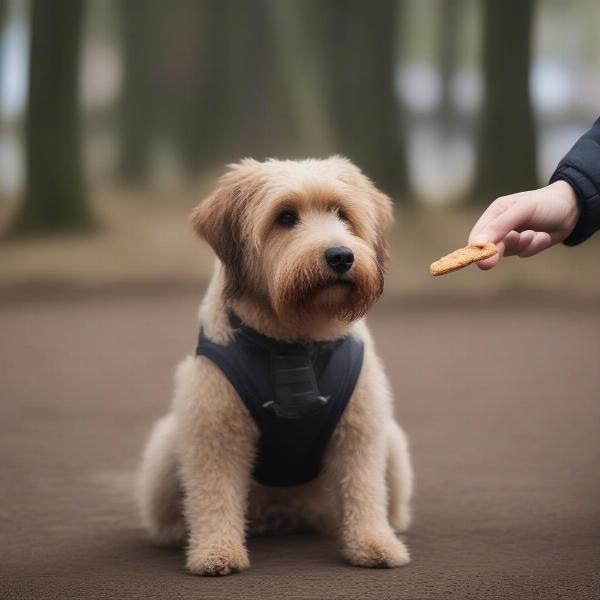Dog teddy bears are capturing the hearts of dog lovers everywhere with their fluffy coats, button noses, and endearing personalities. Whether you’re already a devoted fan or just starting to explore these charming breeds, this comprehensive guide will provide you with everything you need to know about choosing, caring for, and loving a dog teddy bear.
Understanding the “Dog Teddy Bear” Term
What exactly is a “dog teddy bear”? It’s not an officially recognized breed, but rather a loving nickname used to describe several small, fluffy breeds that resemble cuddly toys. Popular examples include the Bichon Frise, Shih Tzu, Cavapoo, and Morkie. These breeds share characteristics like soft, often hypoallergenic coats, playful temperaments, and a generally small size, making them ideal companions for various lifestyles.
Choosing the Right Teddy Bear Dog Breed for You
Selecting the perfect teddy bear dog breed requires careful consideration of your lifestyle, living situation, and experience with dogs.
- Bichon Frise: Known for their bright white, powder-puff coats and cheerful disposition, Bichons are energetic and require regular grooming.
- Shih Tzu: These regal companions are affectionate and adaptable, thriving in both active and relaxed households. Their long, flowing coats demand consistent care.
- Cavapoo: A cross between a Cavalier King Charles Spaniel and a Poodle, Cavapoos are intelligent and relatively low-shedding, making them a popular choice for allergy sufferers.
- Morkie: A mix of a Maltese and a Yorkshire Terrier, Morkies are tiny but mighty, possessing a lively personality and a luxurious coat.
Essential Care for Your Dog Teddy Bear
Regardless of the specific breed, caring for a dog teddy bear involves several key aspects:
Grooming: Keeping Your Teddy Bear Fluffy
Regular grooming is crucial for maintaining a teddy bear dog’s beautiful coat. Brushing several times a week helps prevent matting and tangles. Professional grooming every few months is also recommended for trims and baths.
Nutrition: Feeding Your Teddy Bear a Balanced Diet
A high-quality diet specifically formulated for small breeds is essential for your dog teddy bear’s health. Choose food that provides appropriate levels of protein, fat, and essential nutrients. Consult your veterinarian for personalized feeding recommendations.
Exercise and Mental Stimulation: Keeping Your Teddy Bear Active and Engaged
While small, teddy bear dogs still need regular exercise and mental stimulation. Daily walks, playtime, and interactive toys help keep them happy and healthy.
Training and Socialization: Shaping Your Teddy Bear’s Behavior
Early training and socialization are vital for a well-behaved and confident dog teddy bear. Positive reinforcement methods work best, rewarding desired behaviors with treats and praise. Exposing your puppy to various people, places, and situations will help them become well-adjusted adults.
Health Considerations: Keeping Your Teddy Bear Healthy
Regular veterinary checkups are crucial for preventative care and early detection of any potential health issues. Some teddy bear breeds are prone to specific conditions, so discuss breed-specific health concerns with your veterinarian.
 Training and Socialization for Your Teddy Bear Dog
Training and Socialization for Your Teddy Bear Dog
Conclusion: Welcoming a Dog Teddy Bear into Your Life
Bringing a dog teddy bear into your home is a rewarding experience. By understanding their unique needs and providing proper care, you can ensure a long, happy, and fulfilling life together. Remember to research thoroughly and choose the breed that best fits your lifestyle and family.
FAQ: Common Questions About Dog Teddy Bears
- Are dog teddy bears hypoallergenic? Some teddy bear breeds, like the Cavapoo, are considered relatively hypoallergenic, shedding less than other breeds. However, no dog is completely allergy-free.
- How much exercise do teddy bear dogs need? While they don’t require extensive exercise, they still need daily walks and playtime to stay healthy and happy.
- Are teddy bear dogs good with children? Many teddy bear breeds are known to be good with children, but proper socialization and supervision are always essential.
- How often should I groom my teddy bear dog? Brushing several times a week and professional grooming every few months are generally recommended.
- What is the average lifespan of a teddy bear dog? The lifespan varies depending on the breed, but it typically ranges from 12 to 16 years.
- Where can I find a reputable breeder of teddy bear dogs? Researching breeders thoroughly and checking references is essential. Your veterinarian may also be able to provide recommendations.
- Are dog teddy bears prone to any specific health problems? Some breeds are prone to certain conditions, so discussing breed-specific health concerns with your veterinarian is important.
Related Articles:
dog teddy bear costume
kong dog teddy bear
teddy bear dogs for sale in iowa
ILM Dog is a leading international pet website dedicated to providing expert advice and resources for dog owners worldwide. We offer comprehensive information on dog breeds, health, training, nutrition, grooming, and much more. realistic dog teddy From puppy care to senior dog care, our goal is to empower you with the knowledge and tools to provide the best possible care for your furry companion. dog teddy big Whether you are a first-time dog owner or a seasoned expert, ILM Dog has the information you need. Contact us at [email protected] or +44 20-3965-8624 for any inquiries. We’re here to help you and your dog live a happy and healthy life together.